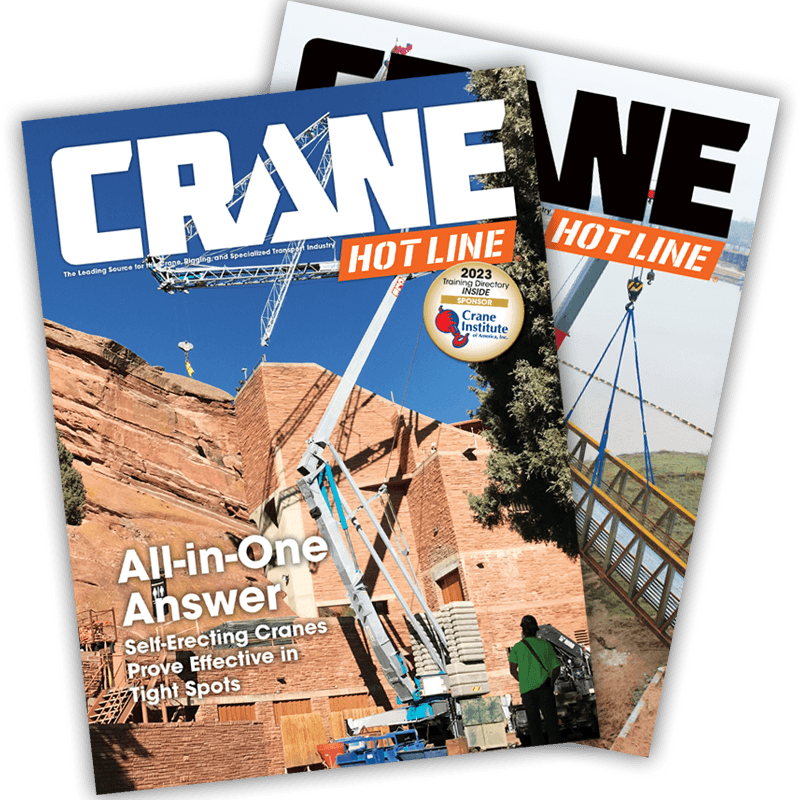Training is the Key
 |
Graham Brent is the Executive Director of the National Commission for the Certification of Crane Operators (CCO), an independent, not-for-profit organization formed to develop performance standards for safe crane operation. For more information, go to www.nccco.org .
August 4, 2004 - Ask a realtor for the three most important factors in making a sale, and the response you're likely to hear is "location, location, and location." The same also can be said of training when predicting success on the CCO certification examinations. While other factors, such as experience, clearly have their place in defining an operator's proficiency, reports from employers, test site coordinators, and training professionals around the country indicate that the candidate who goes into the testing room with the benefit of structured, professional training has a much greater chance of success than his untrained counterpart.
But as an employer, how do you provide that training? The National Commission for the Certification of Crane Operators (NCCCO) does not offer training since that could compromise its objective measurement of a candidate's knowledge and skills. Nor is NCCCO in a position to approve or endorse any training firm or program. That would require a review procedure outside NCCCO's mandate. Nevertheless, recognizing the critical role that training plays in certification, NCCCO works with many firms and individuals who actively train operators in preparation for CCO certification examinations.
An excellent place to get started in the training process is the CCO Candidate Handbook. Although NCCCO does not reveal actual test questions, knowledge areas identified by experts and validated through operator surveys as critical to safe crane operations are specified there, along with a list of reference materials. These publications, including the required reading of OSHA and ASME standards, are used to develop test questions, and they are an excellent source of study material.
![]()
Selecting and scheduling training
The next step is to identify a source of training. You'll first need to assess whether your company has the resources for an in-house program or if you would be better off hiring a professional trainer. Developing an in-house program can be formidable; it takes time, funding and expertise. Once established, however, it allows more scheduling flexibility. If you are going this route, some training firms offer "train-the-trainer" courses that include tutoring in teaching techniques and materials to get you started. Apprenticeship programs or training courses available through Operating Engineers' locals are also excellent sources.
While hiring a professional training firm may be an easier solution, new employees may need to be sent to the school or you may have to wait until it's cost-effective to bring a trainer back on site. However, this approach does mean you will be able to conduct "refresher" training of other employees at the same time.
If you opt to outsource training, NCCCO recommends that you start with training companies that actively provide CCO exam preparation. You should request confirmation that they cover all the knowledge areas on the test. Don't be shy to ask questions such as: How many of your instructors have taken the CCO exam(s)? How many CCO examination preparatory courses have you held? What is your success rate? And, of course, request references. Be sure to have the company's references identify the instructor(s) by name; a good program can fall apart in the hands of an ineffective trainer.
For economic and scheduling reasons, there is a tendency by employers to cram in as much material in as short a time as possible. That's not always the best investment of your training dollars. Short of shutting down for a week, many companies find it is easier to schedule training after hours or on weekends over a period of several months. This has the least impact on work schedules, and it provides a more measured approach to training. Operators can take the information they acquired one day and put it straight to work at the job site the next. Experts agree: There's no better method to reinforce learning than by putting new found knowledge into practice. Moreover, slower learners can use the periods between training sessions to work on their particular areas of weakness.
![]()
Pre-tests
Only by establishing the proficiency level of their operators prior to training (otherwise known as a "training needs analysis"), will employers know how much instruction may be necessary. Before you can expect an operator to accurately read and interpret a load chart, he clearly needs to be able to read. Make no assumptions! Illiteracy and learning difficulties are more commonplace than you might expect.
A simple pre-training test can provide useful insight into an operator's basic linguistic and comprehension skills as well as his knowledge about crane operations. If remedial instruction is required, then clearly the best time to do this is before spending valuable training dollars on trying to teach crane skills.
Pre-training tests can also be useful in achieving employee "buy-in" and overcoming any negative attitudes. Operators who express doubts about their need for training either believe they "know it all" or fear failing the exam and the consequences this may have on their future employability. Pre-tests allow an operator to discover for himself the limitations of his knowledge, to gain respect for the training process, and to realize the personal benefit that his or her full participation can bring.
Pre-tests can also defuse exam anxiety that most employees harbor from their school days. Reports from several test site coordinators and instructors point to the benefit of having students overcome this fear by repeated test-taking during training. This is a strategy that also allows the effectiveness of the program to be monitored and the training focus to be adjusted as necessary. Becoming completely familiar with the details of test-day procedures (registration, rules, seating arrangements, etc.) can also help to calm nerves.
![]()
The importance of load charts
Employers and operators often ask: What areas of the test do candidates most often fail? To use our realtor's analogy again, there are three: load charts, load charts, and load charts. Knowledgeable crane experts all agree there is no more abused, misunderstood, or just plain ignored aspect of crane operations than the crane's load chart-a fact NCCCO can confirm after administering more than 100,000 tests. And yet, without a thorough understanding of a crane's load chart, an operator cannot have an accurate picture of its capabilities or limitations.
In any case, the ASME B30.5 mobile crane standard requires operators to "demonstrate their ability to read, write, comprehend, and exhibit arithmetic skills and load/capacity chart usage, in the language of the crane manufacturer's operation and maintenance materials." Foolhardy indeed is the operator who ignores the rating chart in today's high-tech, versatile machines.
![]()
The bottom line
CCO Update
 click to enlarge> A Liebherr 32TT self-erecting tower crane is put through its paces on the CCO tower crane practical test course at the headquarters of Morrow Equipment Co. in Salem, Ore. |
August 4, 2004 - The following news items are excerpted from the Summer 2004 edition of CCO Update , a newsletter produced by The National Commission for the Certification of Crane Operators.
New Tower Crane Program to be followed by Overhead Crane Operator Certification
In less than 18 months, the National Commission for the Certification of Crane Operators (NCCCO) has launched its newest certification program for tower crane operators. Development of the tower crane program began in March 2003 and the first tests took place in July 2004. It is the first expansion of the certification program since NCCCO was formed in 1995 but will soon be followed by overhead crane operator certification early next year.
The tower crane program is modeled on the existing mobile crane certification program, which includes written, practical, and medical exams and re-certification requirements. Content of the program was developed by 22 subject matter experts over a period of 12 months.
A keystone of exam development activities, noted Phillip Kinser, NCCCO's Manager of Program Development, was the professional Job Task Analysis that the International Assessment Institute (IAI) conducted over an eight-month period. Input from several hundred crane operators helped validate the work of the Task Force in establishing the content of both the written and practical examinations, he said.
Development costs were underwritten by four firms: Liebherr Tower Cranes, Manitowoc Crane Group, Morrow Equipment Company, and Terex Cranes.
![]()
NCCCO Receives 5-Year Accreditation, Elects New Commissioners
The National Commission for Certifying Agencies (NCCA) has awarded a further five-year accreditation to NCCCO. Only a small number of certification programs are able to meet NCCA's exacting standards, and even fewer are granted accreditation for the full five-year period, the maximum NCCA awards.
"This award is coveted by the certification industry for a good reason," said NCCCO President, Ronald Schad. "It demonstrates to employers, as well as the public at large, that an operator certified through the CCO program has met industry-developed standards and has the knowledge and skill necessary for safe crane operations."
That was why, Schad said, all state-mandated operator certification in the last five years (including California and Hawaii) has required certifying bodies to be accredited, and was the reason OSHA was looking at a similar requirement on a federal level.
To qualify for NCCA accreditation, NCCCO had to demonstrate, among other requirements, that it operated independently of training; that its program had been developed and supported by industry; that its tests were psychometrically sound and validated through peer review; and that test administrations were conducted on a standardized, nationwide basis, under strict security.
In other news, at the spring Commission Meeting held in April in Concord, Calif., new commissioners were elected to a five-year terms. Commissioners include Tom Broderick,Construction Safety Councils, Hillside , Ill. ; Donald Frantz, Ohio Operating Engineers, Apprenticeship and Training Fund, Cygnet, Ohio; Kerry Hulse, Deep South Crane & Rigging, Houston, Texas; Ronald Kohner, Landmark Engineering, Roseville,Minn.;Anthony Lusi, Jr.,IUOE Local 542 JATC, Aldan, Pa.; Gene Owens, Granite Construction, Watsonville, Calif.; Carl Springfels, Florida International University, Miami Shores, Fla.;William Stramer, Link-Belt Construction Equipment, Lexington, Ky.; J.R. Williams, Texas Crane Academy, La Porte, Texas; and Paul Zorich, RZP International, Berkeley Springs, W.V. Alternates were also appointed.


